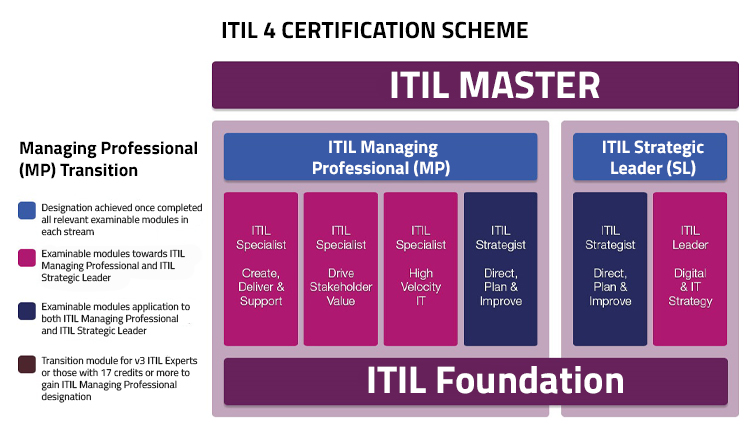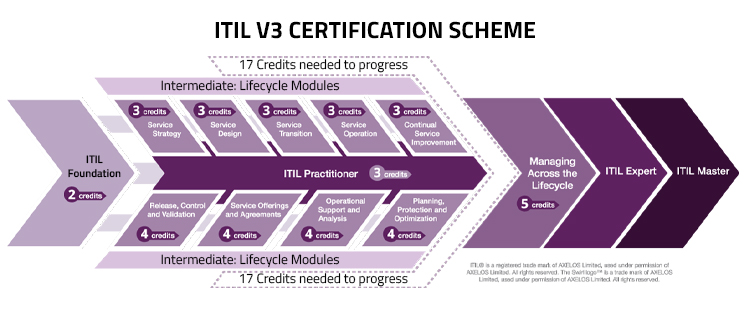Unless you are totally new to the field of IT service management, you would have heard a lot about the hottest ITSM certification – the ITIL certification. ITIL is the most widely recognized framework for IT and digitally enabled services in the world. It provides comprehensive, practical, and proven guidance for establishing an effective service management system. ITIL supports organizations and individuals to derive optimal value from IT and digital services. It helps define the direction of the service provider with a clear capability model and aligns them to the business strategy as well as customer needs.
ITIL is a professionally recognized certification scheme that provides guidance for establishing a service management system, providing a common glossary terms for businesses using IT-enabled services. ITIL is fundamental to businesses, enables transformation, and helps organizations realize value.
ITIL has recently evolved from ITIL V3 to ITIL 4. There is now a clear transition journey from one scheme structure to the other.
The ITIL 4 Certification Scheme
There are four certification levels in the ITIL 4 Certification Scheme. These are:
- ITIL 4 Foundation
- ITIL 4 Managing Professional
- ITIL 4 Strategic Leader
- ITIL 4 Master

ITIL V3 Certification Scheme
Compared to this, the ITIL V3 certification scheme had five certification levels:
- ITIL V3 Foundation
- ITIL V3 Practitioner
- ITIL V3 Intermediate
- ITIL V3 Expert
- ITIL V3 Master
ITIL 4 has been a much-needed refresh of a framework that forms the basis of service management globally. With ITIL 4, the focus is brought on co-creation of value and business outcomes. This takes ITIL out of the confinements of IT and ITSM and gives it a position of immense importance in the business realm.

The five core books of ITIL V3 were:
- ITIL Service Strategy
- ITIL Service Design
- ITIL Service Transition
- ITIL Service Operation
- IITL Continual Service Improvement
ITIL V3 was introduced in 2011. ITIL V3 introduced the concept of Business Relationship Management. It was easier to read and ruled out many inconsistencies compared to the previous versions like ITIL 2007.
But technologies evolve at a very fast pace in today’s times and it is important for frameworks and practices to keep up with this pace. In order to help embrace the new techniques that would bring IT to the next level of efficiency and effectiveness, the ITIL 4 was introduced in 2019. ITIL 4 helps align ITIL with other existing methods and techniques used in an organization, such as IT4IT, Agile, DevOps, and Lean.
What to choose – ITIL V3 or ITIL 4?
If you are already in the process of training for your ITIL certification but have been working towards the ITIL V3 credentials, it would be best to transition towards the closest tier of the ITIL 4 certification scheme. If you are starting your ITIL 4 training afresh, then it would be best to take up training for the ITIL 4 Certification scheme. Either ways, the best path for any ITIL certification aspirant would be to update their credentials to the latest version of ITIL, which is ITIL 4.
ITIL 4 embraces the new technologies and the developments that have taken place in organizations to keep pace with the changing technologies. As newer technologies come to the fore, older ones go obsolete. Similar is the case with the skills. This make it essential to update your skills to the latest available versions and developments in order to stay competitive and relevant. We live in highly competitive times, where change is the only constant. And the best way to stay ahead is to embrace change and new developments. So, the course ahead for all ITSM professionals would be to update their credentials to ITIL 4.
The change from ITIL V3 to ITIL 4 is not just about a change in the ITIL library’s content. It is a change in approach and philosophy. As organizations worldwide embrace the idea that IT functions are not just a support function but an integral part of the business’ success and an indispensable part of the organization structure, ITIL 4 seeks to bridge communication and collaboration within the organization to bring in success and co-create value.
ITIL 4 Training
ITIL 4 training is aimed at IT professionals to help them learn how to align IT with businesses while managing the IT resources in the most cost-effective way possible. ITIL training equips participants with an understanding of the common language used by professionals globally for advanced IT-enabled services.
The first step in the ITIL 4 certification scheme would be the ITIL 4 Foundation. The ITIL 4 Foundation training would cover:
- IT service management concepts
- The holistic approach to co-creation of value
- ITIL guiding principles
- The four dimensions of service management
- Key concepts of Lean, Agile, and DevOps
ITIL 4 breaks down silos and facilitates greater collaboration. It encourages greater communication across the entire organization and not just within and with IT. ITIL 4 takes a more holistic view of the IT functions, while focusing on costs, outcomes, risks, and value. ITIL 4 revolves around core principles, such as:
- Focus on value
- Start where you are
- Progress iteratively with feedback
- Collaborate and promote visibility
- Think and work holistically
- Keep it simple and practical
- Optimize and automate
Where to take the ITIL 4 Training?
Cognixia – World’s leading digital talent transformation company offers the complete portfolio of ITIL V4 training across multiple training modalities for individuals as well as organization workforce. Cognixia is an authorized training organization (ATO) with AXELOS. Our ITIL 4 training is delivered by some of the best and most experienced ITIL trainers. Our ITIL 4 Foundation training takes a unique three-pronged approach to training the participants and equipping them with the essential skills and knowledge to successfully clear the ITIL certification exam and earn the ITIL Certificate. We have a 100% pass rate for all our ITIL 4 Foundation training schedules till date. We also offer a 100% moneyback guarantee for our ITIL 4 Foundation training. So, if you do not clear the ITIL 4 Foundation Certification exam in the first attempt, we will refund your course fee (conditions apply). To know more about our ITIL 4 Foundation training, visit here.

